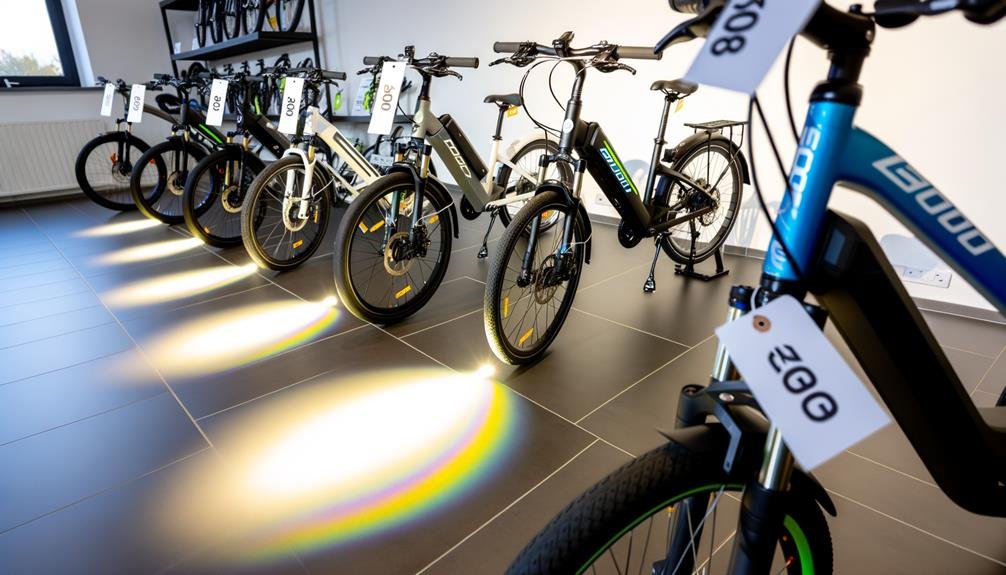Charles Miller is a veteran bike enthusiast with over 12 years of experience dealing with bikes as a mechanic. Despite immense love and expertise for...
As we explore the burgeoning market of electric bicycles, one of the most pertinent questions that arises is the cost associated with these innovative modes of transportation.
The price range of electric bikes is quite expansive, influenced by a variety of factors including, but not limited to, brand reputation, quality of components, and additional features such as battery capacity and motor power.
However, the complexity of these factors can often create a challenging landscape for prospective buyers attempting to identify the most cost-effective choice.
To guide you through this decision-making process, we will systematically dissect the various elements that contribute to the overall cost of an electric bike, allowing you to make an informed decision that aligns with your budget and requirements.
Key Takeaways
- Factors influencing the cost of electric bikes include battery capacity, motor power, torque, reliability of components, and design features.
- Electric bikes can range in price from around $1,500 to over $6,000, with entry-level e-bikes typically priced around $1,000 and high-end models offering advanced features.
- There are over 42 models of electric bikes available in the market, designed for specific purposes such as adventure, commuting, or transporting goods.
- Additional costs associated with e-bikes include maintenance, battery replacement, charging costs, accessories, and optional insurance coverage.
Understanding Electric Bike Costs
When it comes to understanding the cost of electric bicycles, it is essential to note that prices can vary significantly, starting from around $1,500 for a good quality e-bike. Factors such as battery capacity, motor power, torque, reliability, and design features play a substantial role in determining the final cost.
The average price of electric bikes is approximately $2,000, with entry-level options costing around $1,000. High-end e-bikes can reach prices of $6,000 or more, offering advanced features and superior performance. The price range is broad, reflecting the diversity in design, technology, and functionality of these bikes. For those interested in buying an electric bike, understanding this price range is crucial.
It's advisable to avoid e-bikes priced below $500 due to their lower quality components and frame. The speed and level of assistance of electric bikes depend on their classification, further influencing their price.
Ultimately, when considering the cost of an e-bike, the potential buyer should balance their requirements and budget against the bike's capabilities and quality. In this way, they can ensure they are making a worthwhile investment in their mobility and lifestyle.
Factors Influencing E-Bike Pricing
Delving into the factors that influence the pricing of electric bicycles, it becomes apparent that elements such as battery capacity, motor power, torque, reliability, and design features significantly contribute to the overall cost. Electric mountain bikes, for instance, require a higher capacity integrated battery and a powerful electric motor to handle the challenging terrains, thus increasing their retail price.
The type of motor also impacts the cost. A hub motor may be more affordable, but mid-drive motors, which provide better balance and efficiency, are usually more expensive. Furthermore, e-bike models from reputable brands such as Rad Power come with a premium due to their proven reliability and superior after-sale services.
Maintenance costs also factor into the total cost of ownership. Electric bikes with high-end components might require less frequent but more costly maintenance.
| Component | Cost Influence |
|---|---|
| Battery and Motor | High capacity and power increase cost |
| Reliability | Trusted brands like Rad Power charge a premium |
| Maintenance | High-end components might have higher maintenance costs |
Decoding the E-Bike Models and Brands

Having explored the factors that influence the pricing of electric bicycles, we now shift our focus to the variety of e-bike models and brands available in the market, each with their unique specifications and price ranges.
With over 42 models across different brands, e-bikes come in a variety of styles, from the rugged electric mountain bike to the compact folding electric model, each designed for a specific purpose. Consider the pedal assist feature, a common attribute across all e-bikes, which aids the rider's effort and enhances the biking experience.
Brands such as Bikes, offer a range of commuter e-bikes, designed for everyday urban use, and cargo bikes, ideal for carrying loads. These e-bikes incorporate high-quality electrical components, ensuring longevity and reliable performance.
As you delve into the world of e-bikes, it's crucial to consider your intended use. If you seek adventure, an electric mountain bike would be ideal. For urban riding and commuting, a commuter e-bike or a folding electric model would be more suitable. Meanwhile, cargo bikes are perfect for those needing to transport goods. Whichever model you choose, ensure it offers a balance between cost, quality, and functionality.
Additional Costs Associated With E-Bikes
Beyond the initial purchase price of an electric bicycle, prospective e-bike owners should be aware of recurring and additional costs associated with e-bikes. These costs may include maintenance, battery replacement, charging, accessories, and optional insurance.
- Maintenance: Regular tune-ups, brake adjustments, and tire patching are essential for a smooth riding experience, especially for those who prefer upright riding or use fat tires. Depending on the extent of the maintenance required, costs can vary but are typically less than maintaining a used car.
- Battery Replacement and Charging: E-bikes need a battery replacement every 700 to 1,000 charges, which can cost from $350 to $800. Furthermore, charging costs add up over time, with an estimated cost of $1.28 to $4.28 per 1,000 miles.
- Accessories and Insurance: Often overlooked, accessories such as a certified helmet, bike lock, spare battery, and battery charger add to the electric bike bicycle cost. For those in high-risk areas like New York, optional insurance for theft or damage coverage is also worth considering.
Whether you're riding an e-bike for leisure or commuting long distances, being aware of these additional costs will ensure a more enjoyable and stress-free e-bike experience.
Choosing the Right Electric Bike for Your Budget

When it comes to choosing the right electric bike for your budget, it's important to note that the quality, and consequently the price, of e-bikes can vary significantly.
The average cost of an e-bike is around $2,000, while high-end versions can soar up to $6,000 or more, offering advanced features such as powerful motors and longer battery life.
For first time buyers, an entry-level electric bike priced around $1,000 is one of the best options. This range offers decent quality for getting around without breaking the bank. However, make sure to avoid e-bikes priced below $500, as they typically have lower quality components and frames, making the riding experience less enjoyable and potentially unsafe.
Before making a purchase, be sure to check the specifications of the bike, particularly the motor. The motor is a key component that affects the bike's performance, and a good motor can make riding a bike a pleasure.
Frequently Asked Questions
What Is the Average Price of an Electric Bike?
The average price of an electric bike varies greatly, from budget options around $1,000 to luxury models over $6,000. Costs depend on battery lifespan, charging costs, maintenance expenses, and price variations within the second hand market.
What Is the Price of an Electric Bicycle?
The price of an electric bicycle varies based on factors such as its durability, battery lifespan, maintenance costs, charging options, eco-friendly design, fitness benefits, off-road capabilities, and commuting convenience.
Are Electric Bikes Worth the Money?
Electric bikes, with their long battery lifespan, low maintenance costs, and eco-friendly nature, offer health benefits and commuting convenience. They are effective traffic solutions and have off-road capabilities, providing longevity compared to traditional bikes.
How Fast Can an Ebike Go?
The speed of an e-bike is influenced by factors such as pedal assist, motor type, battery impact, and rider weight. Terrain, bike design, and legal limitations also play a role in speed regulation.
Conclusion
In conclusion, the financial investment in an electric bike is contingent upon various factors such as brand, quality, and additional features.
The spectrum of cost, spanning from $1,000 to $6,000, reflects the diversity of e-bikes available. Recognizing the influence of battery capacity, motor power, and design features on price, allows consumers to make informed decisions.
Ultimately, the key determinant of the investment lies in aligning the e-bike's capabilities with the user's requirements and budgetary constraints.

Charles Miller is a veteran bike enthusiast with over 12 years of experience dealing with bikes as a mechanic. Despite immense love and expertise for his Tacoma, he rides his Trek Ebike more. Anytime you meet him, you’ll either hear him talking about Bikes, or writing about all things bikes and cars on this blog.
More Posts


